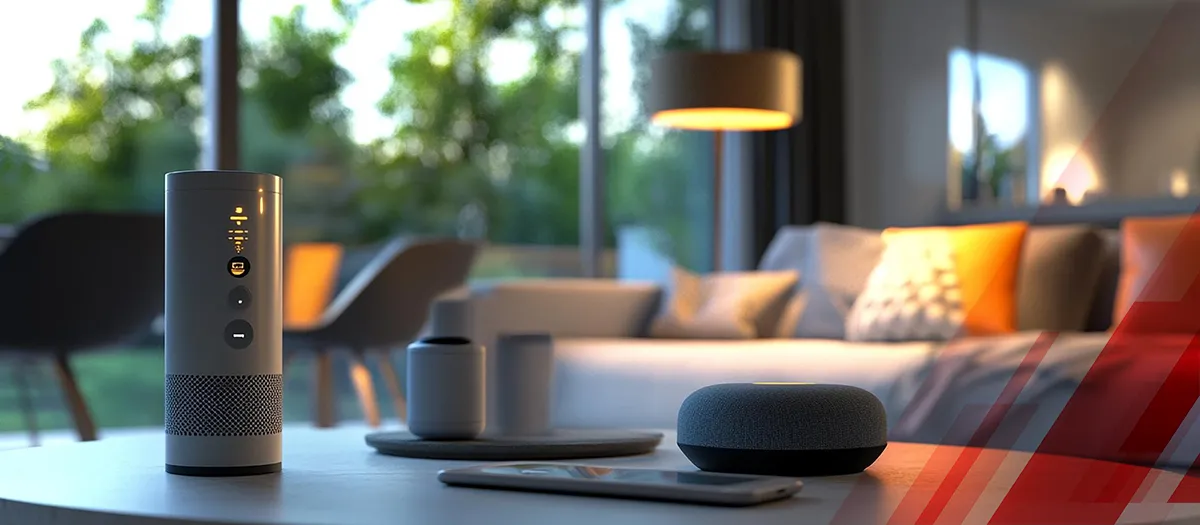Smart home appliances are changing how people use energy, security, and convenience at home. In the European Union in 2024, about 12.8% of people reported using smart home appliances (Source:ec.europa.eu).
Wider tech access is helping adoption: about 80% of U.S. adults have a home broadband subscription, and roughly 90% have a smartphone, creating the connectivity base that smart appliances need. (Source: www.pewresearch.org)
International analyses also show the Internet of Things is spreading quickly across OECD countries, which supports faster rollout of connected appliances and services.
Research and public reports highlight that connected appliances can improve energy management and create efficiency opportunities when paired with home energy systems and smart controls. King Research estimates that the global smart home appliances market will reach USD 170.96 billion by 2031 due to increasing consumer demand for convenience and home security. This blog highlights 15 key players leading the way in this evolving industry.
How Smart Appliances Work?
Smart appliances use Internet of Things (IoT) technology to connect to the internet, allowing users to control them remotely through smartphones, voice assistants, or automation systems. These devices collect and process data using sensors, AI, and machine learning to optimize performance and adapt to user preferences.
For example, smart refrigerators can track food inventory and suggest recipes and smart washing machines adjust water levels based on load size. These appliances also integrate with ecosystems such as Amazon Alexa, Google Assistant, or Apple HomeKit, enabling user-friendly voice control and automation.
15 Key Players Influencing Smart Home Appliances Market in 2026
1. SAMSUNG
Samsung is a global leader in the smart home appliances market, known for its innovative products that integrate AI and IoT for uninterrupted home automation. The company offers a wide range of smart appliances, including refrigerators, washing machines, ovens, and air conditioners, which are designed to enhance user convenience and energy efficiency.
In April 2024, Samsung introduced its latest home appliance lineup at the BESPOKE AI event. The new products feature enhanced AI capabilities and improved connectivity, allowing users to personalize their home experience. Smart refrigerators can suggest meal plans based on stored ingredients, while AI-powered washing machines optimize wash cycles for efficiency. These innovations reflect Samsung’s commitment to advancing smart living through cutting-edge technology.
2. LG Electronics
LG Electronics is a leading innovator in the smart home appliances market, offering AI-powered and IoT-enabled products such as refrigerators, washing machines, ovens, and air conditioners. The company focuses on creating intelligent home solutions that enhance efficiency and user convenience.
In July 2024, LG Electronics acquired an 80 percent stake in Athom, a smart home platform company based in the Netherlands. Athom's smart home hub, Homey, connects numerous home appliances and IoT devices and has a strong presence in Europe. Integrating Homey's capabilities will allow LG to expand its smart home offerings and provide users with a more comprehensive and connected experience.
3. Haier Group
Haier specializes in customized and adaptive smart home solutions, focusing on interconnected appliances that learn user preferences. Its smart home ecosystem allows devices to communicate and adjust settings automatically for efficiency and convenience. Haier’s refrigerators feature adaptive freshness technology, and its washing machines use AI-driven fabric detection. These innovative products make it a leading player in the smart home appliances market.
In 2024, Haier Smart Home, a global leader in home appliances including refrigerators, washing machines, and air conditioners, integrated its recently acquired commercial refrigeration unit, Carrier Commercial Refrigeration (CCR), into its global IT infrastructure with partner Orange Business. This upgrade brings unified multi-cloud connectivity, advanced cybersecurity, and global digital services, aligning Haier’s smart-home appliance business and newly expanded commercial refrigeration portfolio for streamlined operations and growth.
4. Robert Bosch GmbH
Robert Bosch is known for its energy-efficient smart home appliances, offering advanced solutions in the kitchen, laundry, and home climate control. Its home connect platform allows users to control appliances remotely and receive maintenance alerts, ensuring long-term efficiency. Bosch differentiates itself with eco-friendly innovations, such as energy-optimized dishwashers and washing machines that reduce water and electricity consumption without compromising performance.
In June 2024, Bosch updated its Smart Home Controller II to function as a Matter Bridge. This update allows Bosch smart home devices to integrate into a universal smart home network, offering compatibility with devices from various manufacturers.
5. Whirlpool Corporation
Whirlpool is a major player in the smart home appliances market, offering a wide range of connected kitchen and laundry products. Their smart appliances can be controlled remotely via the Whirlpool app, and integrate with voice assistants like Google Assistant and Alexa. Whirlpool focuses on features that enhance convenience and efficiency, such as smart dishwashers that optimize wash cycles and ovens with scan-to-cook technology.
In September 2024, Whirlpool launched its new Smart Front Load Laundry Pair featuring its FreshFlow Vent System. It uses AI and sensors to detect load size and fabric type to automatically adjust water levels, temperature, and wash actions.
6. Miele
Miele is known for its premium smart home appliances, combining precision engineering with advanced automation. Its Miele@home ecosystem connects appliances for improved remote control and integration. Miele’s smart ovens feature FoodView technology, allowing users to monitor cooking progress via a built-in camera, while its washing machines use AI-driven detergent dosing to optimize water and detergent usage
7. ASSA ABLOY
ASSA ABLOY is a global leader in the smart security segment in the smart home appliances market. The company specializes in advanced locks, access control systems, and automated entry solutions. Unlike traditional home appliance brands, ASSA ABLOY focuses on connected security technology, ensuring integration with smart home ecosystems. Its Yale and August smart locks offer keyless entry, remote access, and AI-driven security features, allowing homeowners to control and monitor access through mobile apps and voice assistants. These innovative products strengthen their position as a key player in the smart home appliances market.
9. Tado GmbH
tado specializes in smart climate control solutions, offering AI-driven thermostats and air conditioning controls that optimize energy efficiency and user comfort. Contrary to traditional thermostats, tado devices use smart geofencing technology to adjust heating and cooling based on a user’s location, ensuring energy is only used when needed.
10. Govee
Govee is known for its smart lighting and home automation products, offering Wi-Fi and Bluetooth-enabled LED strips, bulbs, and ambient lighting solutions. Unlike many competitors, Govee emphasizes customizable RGB lighting with AI-driven scene adaptation, allowing users to create dynamic environments that sync with music, movies, or gaming setups.
At CES 2024, Govee showcased its next-generation lighting solutions, including the Govee AI Sync Box Kit 2 and Neon Rope Light 2 for an enhanced gaming experience. Both of these latest offerings from Govee are powered by an upgraded AI algorithm for better energy efficiency and personalization.
11. Honeywell International Inc.
Honeywell is a leading player in the smart home appliances market, focusing on smart home automation and energy management products. The company offers a broad range of AI-driven thermostats, security systems, and air purifiers designed for efficiency and convenience. Honeywell focuses on industrial-grade reliability, bringing advanced climate control and safety solutions into residential spaces.
12. Panasonic Holdings Corporation
Panasonic specializes in energy-efficient and AI-powered smart home appliances, offering smart refrigerators, washing machines, air conditioners, and kitchen solutions that focus on sustainability and user convenience.
In January 2024, Panasonic expanded its partnership with Fresco to introduce an AI-powered cooking assistant for Panasonic kitchen appliances. This collaboration integrates Fresco's advanced AI and smart cooking technology into Panasonic's multi-oven products.
13. Dyson
Dyson offers cutting-edge smart home appliances, focusing on high-performance air purification, vacuum cleaners, and hair care devices. Its smart air purifiers feature real-time air quality monitoring, and cordless vacuums use adaptive suction technology based on floor type.
14. Koninklijke Philips N.V.
Philips is a leader in the smart home appliances market, offering products such as smart lighting, health tech, and home automation. Philips Hue smart lighting system allows users to control brightness, color, and schedules through voice assistants and mobile apps. Philips also integrates smart sleep solutions, such as AI-powered wake-up lights and connected sleep trackers, ensuring a comprehensive approach to smart home living.
15. Alphabet Inc.
Alphabet plays a major role in the smart home appliances market through its Google Nest ecosystem, which includes smart thermostats, security cameras, doorbells, and speakers. Google Nest devices use AI to learn user behavior for better automation, and Google Assistant-powered smart displays and speakers enable voice control across home devices.
Conclusion
The smart home appliances market is poised for continued growth as device connectivity and consumer demand rise. Key industry players are investing in interoperability, improved energy efficiency, embedded AI features, stronger data-security practices, and cross-sector partnerships. Those efforts, combined with public-sector interest in energy and digital infrastructure, should make smart appliances easier to install, safer to use, and more valuable to households by 2026 and beyond.




